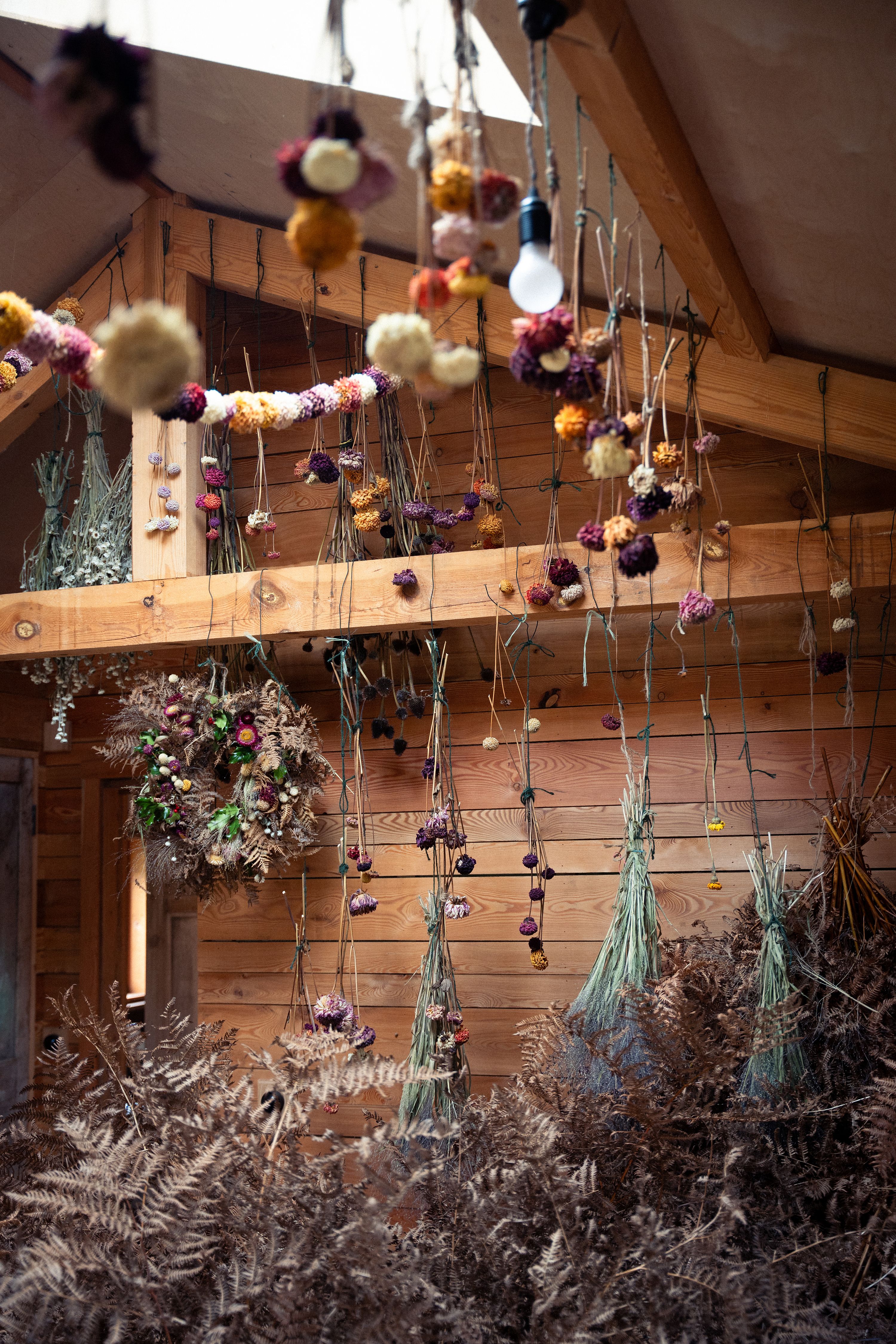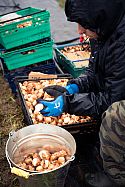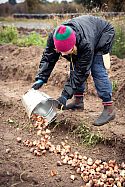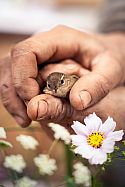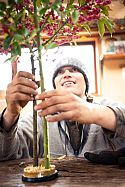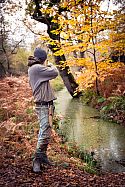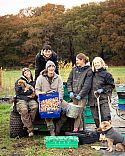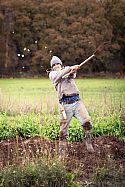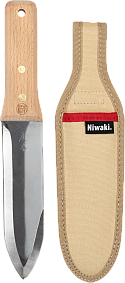Tulip planting with Alfie Nickerson at Burnt Fen Flowers, Norfolk
Square-eyed readers will spot Alfie Nickerson on the final winter edition of BBC Gardeners’ World*, bringing some much-missed summer colour and warmth into sitting rooms up and down the country.
The extraordinary blooms grown by Alfie and his team at Burnt Fen Flowers are indeed marvellous but here at Niwaki we have just as strong an affinity for muddy winter jobs – the sort of jobs that separate the fair-weather gardeners from the real deal. With these self-aggrandising thoughts in mind, a visit to Alfie Nickerson at Burnt Fen Flowers on a bitterly cold Norfolk November day made perfect sense … at least it did in the relative warmth of Niwaki HQ. Out amongst the broads, with a steel-grey sky threatening snow (delivered less than 24 hours later) and a wind to match, the reality of the hard work that goes into those cheery midsummer scenes came sharply into view.
* first airing 13 December, BBC2

Making a start on the first of many tulips bulbs. Alfie gives the team a refresher: pointy end up, not too close and keep your rows neat…it will make life easier when they start to grow.
I loaded up a Niwaki Land Rover with a box of shiny new Hori Hori Pros, a brace of Golden Spades, a few Galvanised Buckets and Niwaki Kneelers and – perhaps most importantly at this time of year – Niwaki Winter Gloves, then headed across the country to meet Alfie and put the tools to the test.
Like many good business ideas, Burnt Fen Flowers took root in the long months of isolation and reflection during the Covid lockdowns. Alfie had been working as a gardener in London for 6 years and was looking for a way to indulge his real passion: growing things from seed. The business was already a year in when Covid hit, but the enforced time away from the day job gave him the time and energy needed to grow his vision … and tens of thousands of seeds and bulbs need a LOT of time and energy. (cont. below)
We meet at Alfie’s nearby home, on a plot that is effectively an island in amongst the broads, and after a quick cup of tea and introductions to cousin Flo, Anna and girlfriend Lil – today’s workers – we cross the sodden ground and network of dykes to the marginally elevated three acres or so of land that contains the polytunnels, flower fields and Burnt Fen Flowers HQ: a custom-built drying and packing cabin that, in the summer, doubles as a dormitory for volunteers and helpers.
With buckets of enthusiasm but little experience Alfie went looking for a mentor. He’d been searching for a way to approach the vital task of improving the soil at Burnt Fen which is sandy and swift to leech nutrients. Researching online, he came across the principles of biodynamic farming and made up his mind to find out more for himself. To that end he spent time volunteering at Fern Verrow, Hertfordshire, the biodynamic farm developed over nearly three decades by Jane Scotter, sometimes known as the Queen of biodiversity.
Whether it was due to a lack of suitable accommodation or else a test of his commitment, Alfie had to sleep in a tent for six long, freezing weeks while he worked as hard as only a younger gardener can, soaking up all the practical and theoretical knowledge he could. Cold and exhausted, the first bite of a Fern Verrow potato – the best he’d ever tasted but denied him until he had proven himself – confirmed in his mind that biodynamic farming was the way to go.
As Alfie arranged bulb after bulb (with a little help from Wilma the French bulldog), apparently unfazed by the wind and sleet (Alfie that is, not Wilma), I asked what biodynamic farming means in practical terms. He explained that the most obvious factor is that not one drop of pesticide is sprayed at Burnt Fen. When they’re out harvesting flowers in the summer, it’s quite usual to find bees snoozing in the flowerhead, but all insect life at Burnt Fen is highly respected: so much so that the minimal packaging employed to move the flowers to London and beyond is emblazoned with creepy crawlies of all kinds and a note stating “No pesticides. May contain bugs”.
Time is also an important factor in biodynamic farming. Bulb planting was taking place on this particular day because, according to the biodynamic calendar, Tuesday 19 November 2024 was a ‘flower day’ – a propitious time to do anything concerned with the cultivation of flowers. Subsequent flower days (of which there are 3 or 4 a month depending on the phases of the moon and the position of the stars) would be spent doing more flower-related jobs, like spraying horn silica – a preparation of ground up quartz meal that has been energised by time spent buried in a cow’s horn.
Alfie freely admits that it all sounds quite witchy, involving, as it does, a degree of faith and ritual that approaches paganism or animism. But so far the results have been impressive, and his growing list of high profile clients confirms this. Faith aside, the ritualistic nature of these tasks offers a helpful structure to the myriad of jobs on the farm and, at times, forces everyone to take a step back from the endless weeding and other menial tasks. The horn silica spraying (which made me think of a priest flicking holy water about) necessarily means half a day or so walking through the flowers with just one task on your mind. At the end of this time the crew gather and discuss what they’ve noticed – what’s thriving and what needs help – allowing them to gain invaluable insight into the general health of the crop that they might not otherwise have made time for. As Alfie says, he just wants to give his beloved blooms the most help he can, and for now, this is the way he’s chosen to do it.
In the future he dreams of adding goats to the farm in order to start a system of small-scale field rotation, with the ultimate aim of making the farm as close to a closed network as possible. He’s not doing too badly at the moment, with a fair amount of manure coming from the neighbouring alpaca farm (or ‘Acapulco farm’ as the early morning dog walker I questioned for directions called it).
Heading back to the cabin for a look at the drying flowers, we pause in the rose garden to plant some stray bulbs in amongst the bare spiky stems and give the Hori Hori a work out. As he grubs away, Alfie tells me about the worm counts they conduct each year to indicate the success of his soil improvement efforts. In the first year, they found 60 worms per metre square. In 2024 it was 110 and in the future he hopes to up it to 200.
The sight of a fat wiggler prompts Alfie to reveal his other great passion in life: fishing. As a younger young man he considered running away to crew a trawler but these days he’s happy to drive through the night to fish tuna and mackerel off the Cornish coast, or, at a push, cast a line into a nearby broad and hope for a pike. There’s an old sofa in the cabin with a stack of fishing mags and when we make it back into the warm we find a wren has got inside and is taking a closer look at a well-thumbed copy of The Angling Times. Alfie captures the bird before Wilma can, releasing it outside while I inspect the clouds of dried fern waiting to be woven into Burnt Fen Flowers wreaths.
Having scoured the garden for any hint of a late flower or interesting berry, Alfie tries his hand at arranging a bough of Spindleberry using a Niwaki Kenzan – the first time he’s tried one – and immediately sees the possibilities these spiky Japanese flower supports offer for displays using next year’s crop. After Apricot Parrot tulips, his top pick for 2025 is Ammobium alatum. It’s a plant that just keeps giving, he explains. The fresh flowers already have a dry, papery character, so you’re not losing too much having them dried. The evidence of his enthusiasm is all around us, hanging in bunches from the rafters and resting in piles on windowsills.
We meet the rest of the cold, muddy yet surprisingly cheerful team back at the house for lunch and multiple cups of tea, then head back to the fields to finish off the day’s bulb planting. On the way we cross the 150 metre long dyke that Alfie re-dug in his first year and now provides not only water for the flowers but also a thriving habitat for fish, waterfowl and all manner of insects. It’s another reminder of the amount of hard graft that has gone into this enterprise and how, with a bit of sensitivity the work that helps things grow can also benefit the environment.
Burnt Fen Flowers’ website proudly states “100% British flowers” to distinguish them from the profligacy of blooms flown from abroad, and it’s estimated their flowers produce 86% less CO2 as a result. Alfie admits that, for now, his bulbs come from Holland – less distance than I travelled from Dorset – and until he can find a source of the same quality, he will have to continue in this way. Perhaps one day there will be a Burnt Fen Flowers signature range of seeds and bulbs: they have begun work on the long, painstaking process of cross-breeding flowers and are starting to see limited but encouraging results.
At 2pm Owen, a friend, joins the ranks, fresh from a half day studying poetry at nearby University of East Anglia. He’s here to help get the final bulbs in the ground (and initiate a brief session of bulb cricket) before the Golden Spades are put to use filling in the trench, or “tucking the bulbs in”.
It’s a long way back to Dorset so I leave Alfie and team, now soggier than ever, to complete the job while an eclectic music playlist pumps out from a portable speaker. As Alfie explains, so much of gardening is planning ahead, and with this thought in mind I make a mental note to arrange a return trip in the summer to witness the fruits (or flowers) of their cold and muddy labours.
